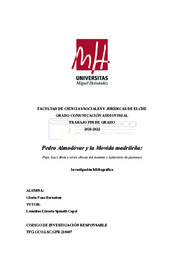Por favor, use este identificador para citar o enlazar este ítem:
https://hdl.handle.net/11000/26631Registro completo de metadatos
| Campo DC | Valor | Lengua/Idioma |
|---|---|---|
| dc.contributor.advisor | Spinelli Capel, Leónidas Ernesto | - |
| dc.contributor.author | Pons Bernabeu, Gloria | - |
| dc.contributor.other | Departamentos de la UMH::Ciencias Sociales y Humanas | es_ES |
| dc.date.accessioned | 2022-04-26T11:38:40Z | - |
| dc.date.available | 2022-04-26T11:38:40Z | - |
| dc.date.created | 2022-02-14 | - |
| dc.identifier.uri | http://hdl.handle.net/11000/26631 | - |
| dc.description.abstract | Este proyecto de investigación bibliográfica indaga sobre la influencia que tuvo el movimiento contracultural La Movida Madrileña en el cine del director Pedro Almodóvar. Este movimiento de los años 80 marcó un antes y un después en la historia de española por su importante influencia en la población más joven. Partimos del análisis sobre las características de este movimiento cultural y el contexto histórico y social en el que nace. El cine del director manchego siempre ha sido un reflejo de una realidad cercana por lo que en sus películas podemos ver lo que vivía la sociedad española del momento. A través de su obra Almodóvar consigue trasmitirnos el espíritu de libertad de La Movida. Este proyecto nos acerca a los dos primeros largometrajes de uno de los cineastas más importantes del panorama español. El fin de este estudio es analizar la etapa inicial del cine de Pedro Almodóvar, poniendo especial atención a sus obras Pepi, Luci, Bom y otras chicas del montón (1980) y Laberinto de Pasiones (1982) y su relación con el contexto social, histórico y cultural. De esta forma podremos entender su filmografía futura, y observar la influencia en el cine español contemporáneo. | es_ES |
| dc.description.abstract | This bibliographical research project investigates the influence that the countercultural movement La Movida Madrileña had on director Pedro Almodóvar's cinema. This movement of the 80s marked a before and after in Spanish history due to its important influence on the younger population. We start from the analysis of the characteristics of this cultural movement and the historical and social context in which it was born. The cinema of the Manchego director has always been a reflection of a close reality, so in his films we can see what Spanish society was experiencing at the time. Through his work, Almodóvar manages to convey to us the spirit of freedom of La Movida. This project brings us closer to the first two feature films by one of the most important filmmakers on the Spanish scene. The purpose of this study is to analyze the initial stage of Pedro Almodóvar's cinema, paying special attention to his works Pepi, Luci, Bom and other girls from the pile (1980) and Laberinto de Pasiones (1982) and their relationship with the social context. historical and cultural. In this way we can understand his future filmography, and observe the influence on contemporary Spanish cinema. | es_ES |
| dc.format | application/pdf | es_ES |
| dc.format.extent | 27 | es_ES |
| dc.language.iso | spa | es_ES |
| dc.publisher | Universidad Miguel Hernández de Elche | es_ES |
| dc.rights | info:eu-repo/semantics/openAccess | es_ES |
| dc.rights | Attribution-NonCommercial-NoDerivatives 4.0 Internacional | * |
| dc.rights.uri | http://creativecommons.org/licenses/by-nc-nd/4.0/ | * |
| dc.subject | Almodóvar | es_ES |
| dc.subject | La Movida Madrileña | es_ES |
| dc.subject | cine | es_ES |
| dc.subject | España: 80´s | es_ES |
| dc.subject | contracultura | es_ES |
| dc.subject | The Madrid scene | es_ES |
| dc.subject | movie theater | es_ES |
| dc.subject | Spain: 80's | es_ES |
| dc.subject | counterculture | es_ES |
| dc.subject.other | CDU::3 - Ciencias sociales::31 - Demografía. Sociología. Estadística::316 - Sociología. Comunicación | es_ES |
| dc.title | Pedro Almodóvar y la Movida madrileña: Pepi, Luci, Bom y otras chicas del montón y Laberinto de pasiones | es_ES |
| dc.type | info:eu-repo/semantics/bachelorThesis | es_ES |

Ver/Abrir:
TFG-Pons Bernabeu, Gloria.pdf
4,74 MB
Adobe PDF
Compartir:
 La licencia se describe como: Atribución-NonComercial-NoDerivada 4.0 Internacional.
La licencia se describe como: Atribución-NonComercial-NoDerivada 4.0 Internacional.
.png)